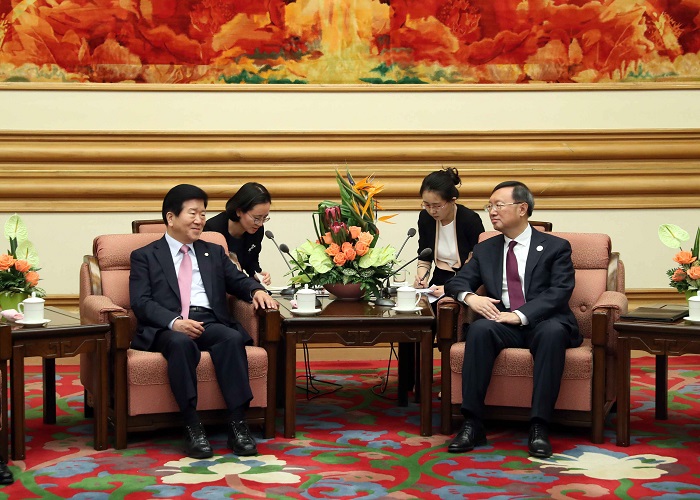How China's Belt and Road is making the world smaller
Published : 23 May 2017, 15:09
As a high-level forum on the Belt and Road (B&R) Initiative took place in Beijing on May 14-15, the China-proposed initiative has again become the focus of the world.
Proposed by Chinese President Xi Jinping in 2013, the Belt and Road Initiative, comprising the Silk Road Economic Belt and the 21st Century Maritime Silk Road, aims to build a trade and infrastructure network connecting Asia with Europe and Africa along and beyond ancient trade routes.
The initiative, which embraces the spirit of peace and cooperation, openness and inclusiveness, mutual learning and mutual benefit, has gained support from more than 100 countries and international organizations, among which more than 40 have signed cooperation agreements with China.
NO MARSHALL PLAN
Amid skeptics questioning China's intentions behind the initiative, Chinese Foreign Minister Wang Yi said: "We have no intention to designate a clear geographic bound for the Belt and Road Initiative, because it is an initiative for international cooperation in its essence, and should be open to all like-minded countries and regions."
Critics have likened the Belt and Road Initiative to the politically laden post-war Marshall Plan.
However, unlike the Marshall Plan, the Belt and Road Initiative will never lead China to form a military alliance, and the economic cooperation it purposes will not change the current security landscape.
In fact, the Belt and Road Initiative was proposed during the post-crisis era when the world urgently needed a more open and inclusive global economy.
Almost nine years after the 2008 financial crisis, the world economy is still struggling to recover. According to a UN Conference on Trade and Development and World Bank report last year, foreign direct investment around the world dropped by 13 percent, while global trade grew by slightly more than 1 percent, the worst performance since the crisis.
Meanwhile, fragmented international cooperation makes it difficult to effectively integrate resources to address global challenges.
Against such a backdrop, Xi put forward the initiative offering opportunities for cooperation and development for all.
"The Belt and Road Initiative, though initiated by China, is not only about China," Xi said. "I hope people in all countries along the Belt and Road will actually feel the benefits brought by the initiative."
"While taking care of our own interests, we will give more consideration and care to the interests of other countries," the Chinese president said.
"The Belt and Road Initiative proposed by President Xi Jinping shows that he attaches great importance to cooperation between Europe and Asia," former French Prime Minister Jean-Pierre Raffarin told Chinese newspaper People's Daily. "It will inject vitality into global development and shows his global vision."
Raffarin said the initiative is a creative one which shows China has the capability to create a new era for global development.
China's proposals, from the Belt and Road Initiative to the establishment of the Asian Infrastructure Investment Bank (AIIB), from the setup of a 1-billion-U.S.-dollar China-UN peace and development fund to a peacekeeping standby force of 8,000 troops, shows the giant is assuming responsibilities as a major country, said Raffarin.
WIN-WIN FOR ALL
Three years on since the Belt and Road Initiative was launched, China and countries along the ancient trade routes are witnessing positive results in infrastructure connectivity, production capacity, trade, investment and finance.
Remarkable progress has been made in the construction of land and maritime routes.
For instance, construction is underway for phase II of the Karakorum highway connecting China and Pakistan, the Multan-Sukkur section of the Lahore-Karachi highway in Pakistan, the China-Laos railway and the Yakarta-Bandung high-speed railway in Indonesia.
Furthermore, the port city in Sri Lanka's capital of Colombo is starting to take shape, while Chinese shipping giant China COSCO Shipping took over the management of the Piraeus Port Authority last year.
Regarding production capacity, China is cooperating with nearly 20 countries, with 51 important projects confirmed with a total investment value of 27 billion U.S. dollars.
Just last year, trade between China and countries along the Belt and Road hit 6.3 trillion yuan (913 billion dollars). China's direct investment in those countries exceeds 14.5 billion dollars.
There's also financial support to ensure Belt and Road projects see the light of day. The China-initiated Asian Infrastructure Investment Bank now has 70 members. The first projects under the 40-billion--dollar Silk Road Fund have begun, with a value of 5.3 billion dollars.
Amid uncertainties in the world economy, Belt and Road cooperation is key to kickstarting global growth.
"What is the most attractive in the Belt and Road Initiative is that it not only spurs China's development but also benefits other participating countries," said Spanish Ambassador to China Manuel Valencia.
WHERE CULTURES MEET
The ancient Silk Road was where Chinese civilization met with Indian, Arab and European cultures. Today, the Belt and Road Initiative seeks to once again bring East and West closer.
"The ancient silk roads are not just routes of trade, but routes of friendship," Xi said.
By the end of 2016, China signed more than 300 cultural agreements with countries along the Belt and Road and set up 11 centers on Chinese culture in those countries.
Meanwhile, people-to-people ties related to the initiative, such as international art festivals, fairs, and forums, are in full swing.
The Chinese government also set up the Silk Road Scholarship to annually sponsor 10,000 students in countries along the Belt and Road to study in China.
"The initiative of the Belt and Road is not just economic," said Nassir Abdulaziz Al-Nasser, high representative for the United Nations Alliance of Civilizations, "but also builds and promotes intercultural exchanges."


